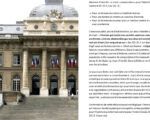>> Kenyan judge upholds use of anal probes to determine sexual orientation
[spacer]
Un tribunal kényan a rejeté jeudi une requête contestant la légalité de l’examen proctologique pour confirmer l’homosexualité supposée d’un homme, rapporte l’AFP. La question avait été soulevée par deux hommes qui avaient été forcés à en subir un.
La loi kenyane prévoit en effet de punir jusqu’à 14 ans de prison pour le soi-disant délit de « relations charnelles contre-nature » et « il n’y avait aucun autre moyen qu’une analyse anale pour que des preuves de leur homosexualité puissent être obtenues », a ainsi estimé le juge du tribunal de Mombasa (sud-est), Anyara Emukule. Les deux hommes devraient faire appel de ce jugement.
« Bien que les poursuites pour rapports entre personnes de même sexe soient rares au Kenya », l’homophobie y « reste un problème majeur » et la réponse des autorités à « des agressions collectives ou à d’autres formes de violences contre les homosexuels a été limitée », avait regretté dans un rapport de septembre 2015 l’organisation Human Rights Watch.
« Beaucoup de victimes ne déposent pas plainte, estimant que la police ne les aidera pas ou, pire, qu’elle pourrait les arrêter plutôt que leurs agresseurs. Dans plusieurs cas, les victimes ayant tenté de déposer plainte se sont heurtées à des discriminations policières, certaines ayant été moquées, d’autre harcelées ou se voyant refuser le droit de faire une déclaration », avait expliqué l’ONG.
[spacer]
[spacer]
Dénoncer les homosexuels, tout en défendant les valeurs du christianisme évangélique, étant également la garantie de faire le plein de voix lors des élections, « le président Kenyatta a récemment décrit les violations des droits des homosexuels au Kenya comme n’étant pas un problème », avait rappelé Lorna Dias, Coordinatrice exécutive de la Gay and Lesbian Coalition of Kenya (GALCK), un regroupement d’organisations dont PEMA Kenya (qui fournit un soutien aux minorités sexuelles et transgenres en matières de droits humains, de santé, de VIH/sida et de bien-être économique) est membre.
Rappelons que l’homosexualité est illégale dans trente-six des cinquante-quatre pays d’Afrique et passible de la peine de mort dans quatre d’entre eux (en Mauritanie, au Nigeria, au Soudan et en Somalie), selon Amnesty International.
Malgré ce contexte répressif, une veillée a été organisée mardi à Nairobi au Kenya par la communauté homosexuelle pour rendre hommage aux victimes de la tuerie d’Orlando aux États-Unis.
[spacer]
>> Human rights groups expressed outrage on Thursday over a Kenyan court’s decision to uphold mandatory anal examinations of men who were suspected of being gay.
In Kenya, a colonial-era law prohibiting « carnal knowledge of any person against the order of nature » is widely understood to prohibit anal sex or sex between men. On Thursday, a court in Mombasa denied a petition to overturn the government’s practice of subjecting men to forced anal exams.
While human rights groups criticized the exams as abusive and medically worthless, government officials argued that they were a useful way to tell if a man was gay.
« This ruling is a devastating precedent that has now heightened the risk and fear of similar anal testing on many lesbian, gay, bisexual, transgender, intersex and queer persons in Kenya, » said Eric Gitari, executive director of the National Gay and Lesbian Human Rights Commission, a Kenyan advocacy group.
« Suspecting someone of being gay should not be grounds for stripping them of their dignity and their fundamental rights. »
In many African countries, homosexual sex acts are illegal. A few years ago, some Ugandan politicians tried unsuccessfully to pass a bill to impose a death penalty for homosexual acts. Later, it emerged that a team of American evangelical Christians had helped the Ugandans shape their anti-gay campaign.
In Kenya, the case involving the anal exams began last year, when two men were arrested at a bar near Mombasa by police officers who suspected them of being gay. The police obtained a court order for the anal examinations.
The two men signed consent forms for the exams and H.I.V. tests; they have since claimed that they did so under duress.
The men, with the help of gay rights groups, filed a petition asking the court to declare anal exams unconstitutional and to throw out evidence collected from them.
But Justice Anyara Emukule of the Mombasa High Court ruled against them, saying that it was clear to him that the men “willingly and voluntarily consented” to the exams.
An appeal of the ruling is likely.
















